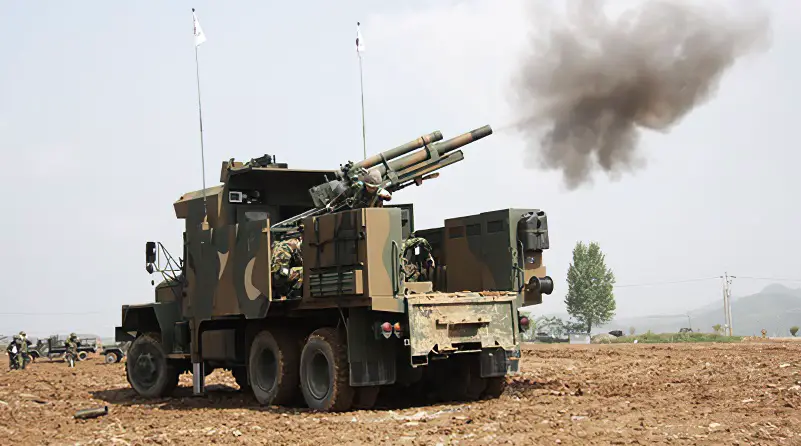The EVO-105 (initially called Evolved Wheeled Self-Propelled Howitzer) or K105A1 (for the Republic of Korea Army) self-propelled artillery system developed by Samsung Techwin (now Hanwa Aerospace) mounts a M101 barrel assembly, recoil system, and breech onto the bed of a Kia KM500 (6×6) 5-tonne truck chassis. The evolved wheeled howitzer is equipped with an automatic fire control system and positioning system, increasing its operational efficiency to a greater extent. The EVO-105 is an automated system that can be operated with five soldiers, compared to older models operated by nine troops.

The heart of the system is the solid, dependable M101A1-series of 105mm light artillery piece (and M2HB .50 caliber heavy machine-gun is carried in a ring mount over the truck cab for close-in vehicle defense). With a range of over 11km, the M101A1 has earned a well-deserved reputation for reliability, speed and accuracy. The gun’s 11.3 km range meant it would act “like a mortar” in an infantry fire-support role and complement the longer-range 155 mm K9. The howitzer is a cost-efficient weapons system to help enhance artillery power, as it can use conventional ammunitions with a lower acquisition cost.

The Republic of Korea Army had over 2,000 M101 howitzers and over 3,000,000 shells in inventory at the time the K105A1 was developed. Although the ROKA operates around 2,000 155mm self-propelled howitzers, an operational requirement for 105mm howitzers still exists. The K105A1 features digital fire control, GPS/INS systems, decreased deployment time and a significantly reduced number of crewman. The K105A1 is intended to be distributed among infantry divisions as brigade-level fire support asset. Production line being used to manufacture K105A1 was originally intended for K10 ammunition resupply vehicles.

The wheeled self-propelled howitzer system was quicker to deploy, fire, and reload than towed 105 mm guns and has a maximum rate of fire of 10 rounds a minute. Sustained rate of fire is typically three rounds a minute with a crew of five. The system is extremely fast into action, requiring less than sixty seconds to stop and shoot, versus four and a half minutes for its towed counterpart. There is no need to dig a recoil pit, and the weapon retains its high angle of elevation. Displacing from a position is even faster, as the EVO requires only 30 seconds to start its movement.
















